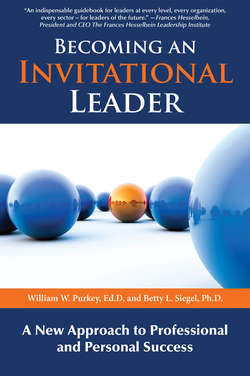Читать книгу Becoming an Invitational Leader - William W Purkey - Страница 9
На сайте Литреса книга снята с продажи.
– Chapter 1 – Foundations of Invitational Leadership
Оглавление“Leadership is a matter of how to be, not how to do. We spend most of our lives mastering how to do things, but in the end it is the quality and character of the individual that defines the performance of great leaders.”
—Frances Hesselbein, Leader to Leader
Questioning what gives our lives meaning and purpose is a process that should be taken quite seriously. Indeed, answering this question helps invitational leaders craft narratives of their personal and professional lives — stories that evolve as their ideas change, and as they themselves change, revealing ever-new possibilities for their careers and colleagues. Further, and perhaps most importantly, asking and answering such a question should be a natural extension of a continuous internal dialogue. This dialogue is a key component of what it requires to become an invitational leader. It is also central to the development of a positive and realistic self-concept.
Taking this type of searching inventory enables a leader become more consciously aware of him- or herself, and by so doing, take responsibility for how he or she defines that self. After all, if we perceive ourselves to be lacking in some fundamental leadership quality, then surely we will fail to move others to join our cause. But if we can learn to speak invitationally to ourselves — if how we speak to ourselves helps us define a largely optimistic self-concept — then the sense of possibility in our personal and professional lives will expand exponentially.
Our perceptions of ourselves, others, and the world are so real to us that we seldom pause to question them. Yet, human behavior is always a product of how we see ourselves and the situations in which we are involved. Although this fact seems obvious, the failure of people everywhere to comprehend it is responsible for much of human misunderstanding, maladjustment, conflict, and loneliness. In Invitational Leadership, being aware of, and questioning, our own perceptions is the first step in a re-visioning and re-calibrating of our relationships and responsibilities.
In Walker Percy’s novel, The Moviegoer, narrator Binx Bolling discusses what he calls “repetitions” — “the re-enactment of past experience toward the end of isolating the time segment which has lapsed in order that it, the lapsed time, can be savored of itself and without the usual adulteration of events that clog time like peanuts in brittle.” In other words, by recreating the past for himself, Binx is able to give it heightened meaning. This is but one of the ways Binx engages experience deliberately and thoughtfully. For instance, he might insist upon seeing a favorite movie in the exact manner in which he saw it the first time — even to the point of sitting in the same seat. By becoming hyper-aware of his actions, he avoids the general devaluation of repetitive experience. Or, as he puts it, he refuses to be defeated by the “malaise” of unquestioned existence.
Binx’s existential approach to things can help us understand how leaders learn to think invitationally by first becoming aware of the possibility of doing so. Inspired by the knowledge of this possibility, we are able to step outside of ourselves and observe our behavior more clearly, re-evaluate our perceptions, and question how our actions and words become part and parcel of a larger vision of the world. Thus, we defeat the “malaise” of an unexamined life, turning toward a more joyful, thoughtful, and meaningful existence. This process begins with a deeper understanding of those three cornerstones of Invitational Leadership: the perceptual tradition, self-concept theory, and the “whispering self.”
